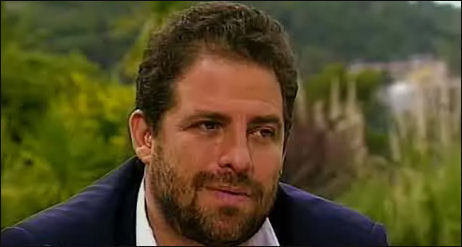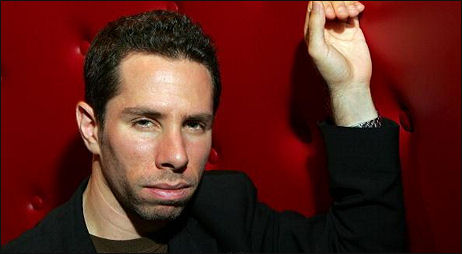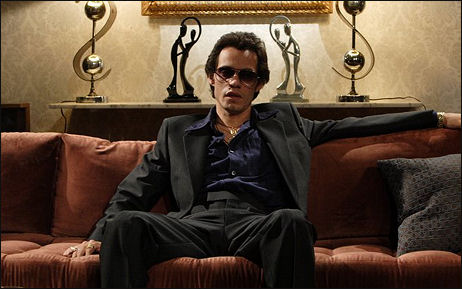Keith Richards‘ manager Jane Rose flat-out lied to MTV.com’s Kurt Loder on 4.3.07 when he called to check on the story about Keith mixing his dad Bert’s ashes with some cocaine and then shorting the mixture up his nose. Rose said the snorting story was “untrue” and “made in jest,” but yesterday Richards told an anonymous Daily Express reporter that he “did inhale his father’s remains — just not with blow. ‘The cocaine bit was rubbish,’ Richards is quoted as saying. ‘I said I chopped him up like cocaine, not with.'”
The fibbing may not have been Rose’s idea entirely. When the story was retracted it was presumed that former Disney publicist Dennis Rice or some other lackey in the pipeline had strongly urged the Richards’ camp to make the Bert story go away because dad-snorting would turn off the family audience that Disney was looking to pull into Pirates of the Caribbean 3: At World’s End, which Richards had a small cameo part in.
Day: August 3, 2007
Career Killer
Studio exec #1 on Lindsay Lohan: ”Her troubles are what made her famous. Her films don’t open. She’s a pain to work with. I think she’s done.” Studio exec #2: ”She had the world at her feet, and right now she’d have to pay a studio to get herself into a movie.” Studio exec #3: ”I think she has to stay alive.” — from “I Know Who Killed Your Career,” an 8.2.07 Entertainment Weekly article by Sean Smith.
There Will Be Blood
When you watch There Will be Blood, “expect a film with mesmerizing imagery. Director Paul Thomas Anderson seems intent on creating iconic images for the modern age. In my opinion, the best way to describe the essence of this film is that it will be Kubrickian. For those Anderson fans who’ve been waiting for five years, the trademarks remain intact — the camera follows characters in long-sustained shots, there are scenes of intense emotion, and by God there will be blood. I would not call the material overtly violent, but nonetheless the deaths and murders that the script describes are both horrifying in their graphic rawness and their dark intention. This picture will be a harrowing experience, and not just in its visuals.” — From a script review by Oscar Igloo‘s Robert Cameron.
“Lambs” Afghanistan trailer
The high-def trailer for Robert Redford‘s Lions for Lambs (MGM/UA, 11.9). Three story threads — a California professor (Redford) and his students (Derek Luke, Michael Pena, and then later on Andrew Garfield), a high-powered Senator (Tom Cruise) and a journalist (Meryl Streep), and Redford’s two earlier students (Luke, Pena) slugging it out in Afghanistan.

How come we haven’t heard about this very-much-of-the-moment, headline-reflecting drama going to the Toronto Film Festival? Let me guess. The view is that it’s a major stand-alone film that will only be devalued by taking part in a huge, high-toned clusterfuck like Toronto. Or Redford, Cruise and Streep are considered too important to take part in a clusterfuck. Or someone is thinking that a soldiers-in-Afghanistan film vs. two Iraq films (In The Valley of Elah, Redacted) will make for one too many Middle Eastern conflict movies, especially at a film festival commonly regarded as a clusterfuck.
Golden-hued lighting
The more golden-hued the lighting, the pricier the clothes, the more spotless the sets, the more perfect the hair on the actors….the more insipid the film is.
Movies by Morris
I don’t know how many years ago Errol Morris assembled this short, but some of the comments are fairly wonderful. And I love that guy who’s interpreting for Mikhail Gorbachev.
Foundas likes Ratner
You really have to hand it to Scott Foundas for writing a big L.A. Weekly piece that says Brett Ratner “is a talented filmmaker who deserves to be taken seriously.” If you’re not willing to say the unpopular thing now and then, you’re not worth very much as writer, and for this Foundas has my respect. Even if his proposition — call it a notion — is only half-right.

Brett Ratner
Ratner is a talented filmmaker. Perhaps moderately, perhaps more so. But so far he hasn’t done much with his gifts except make commercial “movies.” And by my standards, he hasn’t put any serious feeling, conviction or high-level craft into any of them. And forget original or innovative. Ratner’s longstanding yen to be a successful, well-paid director and groove with the commercial swing of things gives him a tomcat joie de vivre aura — he’s not Todd Louiso — but his films feel much more like “displays” or “presentations” than anything else.
Ratner is not Karel Reisz, Samuel Fuller or Curtis Hanson. You can’t equate him to middle-range talents who’ve enjoyed admirable flare-up periods like John Frankenheimer or Irvin Kershner. He sure as hell isn’t a stylist like Val Lew- ton. At best he may be Phil Karlson or Mervyn LeRoy. He’s not even Arthur Hiller, who at least made The Americanization of Emily and The Hospital. I’m not one of those who lumps in Ratner with satanic forces like McG, Michael Bay, Stephen Sommers or Roger Kumble, but I do think the best anyone can say about him is that he’s an above-average hack with formidable social skills.
The core of Foundas’ argument is that “it matters to Ratner that his films seem expressive of his personality.” His examples are Money Talks (’97 — Ratner’s first feature), After the Sunset (’04), and “perhaps most of all” the Rush Hour movies.” Ratner, says Foundas, “is there in the preponderance of classic r & b and hip-hop on their soundtracks; in their exuberant celebrations of beautiful women, fast cars and other assorted bling; and in their conscious homages to the movies that made Ratner want to become a director in the first place.”

Scott Foundas
But to me the whole take-Ratner-seriously idea falls apart when you read that the 38 year-old director has told people “that The Family Man is his most personal film.” That’s the film in which Nicolas Cage decides it’s better for his soul, his marriage to Tea Leoni and particularly the welfare of his kid to go back to New Jersey and sell tires rather than live the the uptown life of a well-paid businessman. I always thought that was a cloying and dishonest view of things, and that anyone who would embrace it as something real and profound has a stunted view of human nature as well as bad taste.
I got to know Ratner a few years ago through my friendship with James Toback. Ratner was friendly, gracious and a good fellow when I visited him at his Benedict Canyon home. He picked up the phone after that and all was well.
Then I saw him at Cinevegas in ’02 and happened to ask him at one point why his ex-girlfriend Rebecca Gayheart, whom he had helped with emotional support and legal assistance after her involvement in a terrible accident in ’01 in which a child was killed, wasn’t attending the festival with a short film she’d made (a pretty good one called Me and Daphne) that the festival was showing. Ratner said she couldn’t come because she was visiting family. That was hard to swallow. I felt dissed, in fact, by being fed a half-truth, and I expressed this doubt in a column. The next thing I knew Ratner’s attorney Marty Singer was on my cell phone threatening me.
I took down the sentence about Gayheart’s no-show, but I thought about this later on. Ratner had lied to me, and then he told a pit-bull attorney to get in my face when I wrote that I felt I’d been lied to. I decided from this episode that he’s a snowjobber and a bit of a thug. But a lot of people b.s. a lot of other people in this town, and I decided later on that Ratner was expressing his feelings of loyalty and protectiveness for Gayheart when he had Singer call me. Let bygones be bygones, I figured. But he’s still not that much of a director, and I honestly don’t think he’s on his way up anytime soon.
Theresa Duncan’s favorite bloggers
Stories about the recent suicide deaths of writer Theresa Duncan (Tylenol and alcohol) and then her boyfriend Jeremy Blake (walking into the sea like Sterling Hayden did in The Long Goodbye) are all over the place. L.A. Fishbowl‘s Kate Coe has an L.A. Weekly story in this week’s issue, Chris Lee has an 8.3 story about the tragic duo in the L.A. Times, and Lee says in an online chat with Coe that Vanity Fair, the New Yorker, New York magazine and CNN’s Anderson Cooper are also preparing reports.

the late Theresa Duncan
It therefore felt a bit creepy when by Awards Daily‘s Sasha Stone sent me a page of Duncan’s elegant blog (called “The Wit of the Staircase”), dated 2.21.06, that listed “Four Bloggers J’Adore” as follows: “1.Jorn Barger, 2. Lauren Cerand, 3. Jeff Wells, 4. Bad Feminist.” Flattering, okay, but this means there’s something about Hollywood Elsewhere that appeals to the mind of an obviously bright, attractive, 40 year-old woman who decided to off herself. I’m not sure I feel 100% great about this. There’s no romance or transportation in suicide. There is only ink, blackness …plug pulled.
Then Stone wrote once more and pointed out the existence of another guy named “Jeff Wells” whose site is called Rigorous Intuition. So never mind. (Sorry for calling it Rigorous Institution earlier, but a part of me automatically gravitated to that wording. Sound funnier, for one thing.)
“Bourne” projections
In yesterday’s weekend box-office story, Variety‘s Pamela McLintock would only say that Paul Greengrass‘s The Bourne Ultimatum, which is opening today in 3,600 situations, is likely to rack up the best opening of the franchise. No specific projections, but she believes it’ll make more than the $52.5 million earned by The Bourne Supremacy when it opened on 7.23.04. For all I really know Ultimatum may only make a few bucks more than Supremacy, but the awareness and interest levels are truly over the roof, and this tells me it might actually hit $70 million, or at least $65 million and change.
Penn visits Chavez
I’m offended by the implications in mainstream reports that Sean Penn is doing a wrong or imprudent thing in visiting Venezuelan president Hugo Chavez, and for applauding the leader’s trashing the U.S. waging of the Iraqi War, and for graciously nodding as Chavez calls him “brave” for urging Americans to impeach President Bush. Just as I’m offended by the constant characterizations of Chavez as some kind of wildcard nutbag in the vein of Iran’s holocaust-denying Mahmoud Ahmadinejad.

In my book Penn and Chavez are both okay guys with reasonable humanistic attitudes and the courage to speak out against the corporate liars and greed-heads of the world.
I’m not a Chavez scholar or historian, but I’ve frankly been a kind of fan of the guy since seeing Kim Bartley and Donnacha O’Briain‘s The Revolution Will Not Be Televised — a perhaps slanted but still wonderfully rousing documentary about the failed April 2002 right-wing coup against Chavez — at the 2003 Toronto Film Festival. Is Chavez an egotist and a bit of a bully in some respects? Maybe, but politics is a very rough game in Venezuela. I know that he’s always been against the the oil-rich oligarchs in that country and in league with the disenfranchised, and that he’s down on the Bushies and their neocon agenda. In my book that’s a pretty good place to be coming from.
Bartley and O’Briain’s doc basically says that Chavez is supported by the poor and disenfanchised, and is pretty much hated by the moneyed classes. It doesn’t mention anything about his support with the poor drying up because he’s failed to push reforms, so maybe that’s the case now. But the doc persuaded me that the righties tried to blame the leftist Chavez supporters for the shootings that happened before the April ’02 coup attempt, even though right-wing thugs were the clear provocateurs in this situation. The doc contended that the privately run TV companies are total mouthpieces for the oligarchs, and that they didn’t report the truth of what was happening during the counter-coup and in fact spread lies.
Speaking before an auditorium “packed with his red-clad supporters,” Chavez called upon Bush to “withdraw the troops from Iraq…enough already with so much genocide,” according to an AP story by Ian James. “Penn sat near the front, at times applauding and nodding in agreement. He is the latest in a series of celebrities who have visited Caracas, including Danny Glover and Harry Belafonte.”
Bogus Bourne DVD?
London reader Pavan Shamdasani is claiming that The Bourne Supremacy: Extended Edition, a Region 2-only release, isn’t extended at all and is “the exact same cut of the previous version,” according to his own calculations. He knows this, he says, because he compared the “Extended Edition” with the previous Region 2 version.
“I find this to be completely unethical on the part of Universal,” Shamdasani writes. “It seems to echo what they did with their release of The Bourne Identity: Explosive Extended Edition, except this time its far worse. Not only did they release a second edition of a DVD a few weeks before its sequel is released in cinemas, they slapped on the words “Extended Edition” so that every fan of the film runs out to buy it, when there is not one extension in the slightest.
“I attempted to contact Universal UK about this, sending them a very impassioned letter but have heard no reply in the past couple of days so I figured I’d spread the news to the fans. The average buyer won’t put in the time and effort to compare the two versions, accepting that there are extensions even if they can’t see them. Here’s a link to the Bourne DVD Amazon page where a couple of reviewers (myself included) have already caught on.”
Artists swirling downward
I think I can honestly say without qualification that I am officially past the point where I can watch another biopic about a charismatic but self-destructive artist (Talk To Me, La Vie en Rose, El Cantante, Walk The Line, Ray, Who is Harry Nilsson and Why Is Everyone Talking About Him?, Great Balls of Fire, Bird, The Doors, A Face in the Crowd) with any kind of receptive, open-pore attitude.
To judge by these and other biopics (the latest of which is the critically savaged El Cantante) the vast majority of all major pop artists seem to have lived the exact same lives and grappled with the exact same substance-abuse problems, and I’m just sick to death of this same damn story being told over and over.
That doesn’t mean I’m suddenly now open to Disney-produced, G-rated biopics about artists with sunny attitudes with families and friends that love them without exception. I know what artists are like for the most part, and that the better ones are always grappling with doubts and demons of one sort or another. As an HE reader wrote last year in response to my review of the John Scheinfeld‘s Harry Nilsson doc, “The third act of any artist’s life always sucks.” It’s just that I’ve seen too many of these downward-swirl stories, and I can’t watch any more without making cracks at the screen.
Andrew Sarris had a similiar end-of-the-line experience with the films of Jean- Luc Godard, he once told me. It was sometime in the early ’70s, as I recall, when he explained to New York Film Festival director Richard Roud that he was off the Godard boat. We all reach these points, I think. Wait…this is a thread. What genres, stories and filmmakers have you had it up to here with and can no longer tolerate?

